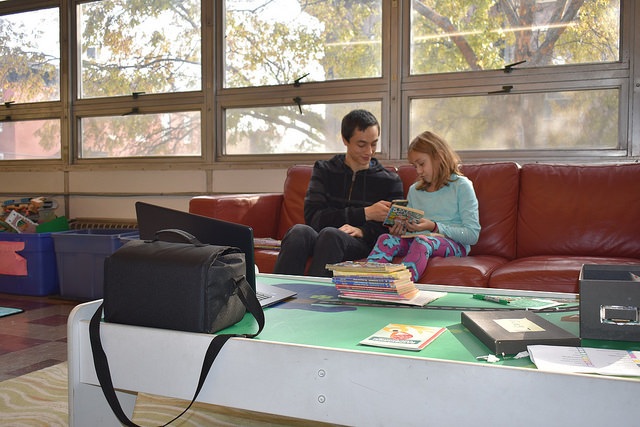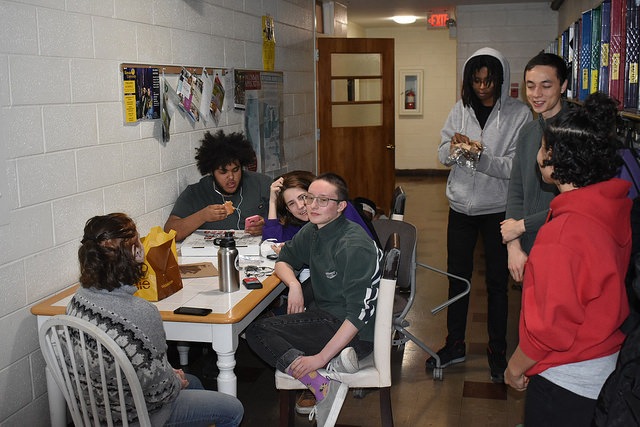Our Aggressive Tuition Assistance Makes Our School Stronger by Luke Byrnes
Exposure to educational content is a fundamental question that all educators, home schoolers, teachers, and democratic free schoolers must address. Exposure is the deeper question people often have in mind when they ask, “What if a kid wants to learn carpentry?”, “What if they want to take violin lessons?”, or “How do they learn to read?”

Before a person can read, books and words need to be somewhere in their immediate environment, and they have to know that the concept of books and words exists. Before a person can learn violin, they have to gain access to a violin, and they have to learn that learning to play violin is an activity they can pursue. It is the same with carpentry and the same with any subject. Before the urge to learn can happen, exposure to a subject, even in an abstract way like a conversation, has to happen. At a more fundamental level, when we ask about subject matter, we are asking how will the students become exposed to this subject matter.
Setting children loose to freely converse is one of the major differences between free schools and conventional schools. One of the most common ways that kids at Philly Free School get exposed to concepts, trades, skills, and information is through the incessant chatter of conversation taking place between students and staff around the school everyday. Schools like PFS hold space for endless intellectual engagement through conversation and discussion. A former student from Sudbury Valley School - one of the models and mothers of PFS and schools like it - tells a story in The Pursuit of Happiness: The Lives of Sudbury Alumni of how the stimulating social environment drew them back to SVS as a staff member.
I always tell people that the reason that I went back to Sudbury Valley as a staff member is that I have never been in a more intellectual community in my life. I have never seen another place where people would talk about everything starting from first principles, and mean it - and not for grades. People are in the conversations because they want to be there. They’re not trying to impress anyone with their knowledge, they’re not trying to win praise, they’re just talking about these things because they’re so interested. I wanted an intellectual community, I wanted to be part of that kind of give-and-take, and I really have seen very little of it outside of Sudbury Valley, although I’ve been to a lot of universities.
In my experience here, and from asking other staff and students here, Philly Free School has a similar atmosphere to what this anonymous alumni describes above. When people are free to communicate, they talk, A LOT. Conversation is a serious form of free play.

Conversations need people. It follows then that a greater diversity of people will lead to a greater diversity of conversations and to an increase in exposure. To return to the opening question of this essay, for democratic free schools, a key way to increase exposure to educational content is to increase the diversity of the school.
Diversity in hierarchical human societies largely comes in two forms: diversity of groups, and diversity within groups. The diversity within groups is the easier of the two forms of diversity for democratic free schools to address. A larger student population will tend to increase the diversity within the existing groups of the school, which will increase the diversity of topics for conversation. As the school grows, different life paths and interests will continue to enter the space of conversation and increase exposure.
Supporting a diversity of groups in democratic free schools is the more challenging issue to address. It requires a sensitivity to the differential distribution of opportunity that continues to haunt our society. It requires a sensitivity to socioeconomic class and history. Things have happened and we cannot ignore them and we don’t need to wait for other social institutions to address them. We can and should address them now with our friends and community. If we are going to offer our kids the full benefits of exposure, it means acknowledging that we live in a hierarchical society, a class based society, and that certain classes cannot afford to spend meager financial resources on private schools like Philly Free School. It means adopting strategies for addressing this lack of access so that the students will have the full benefit of exposure. Addressing this issue means that class, race, historical and contemporary dispossession, privilege, and other related concepts can be discussed from the point of view of each person’s actual lived experience.

On a financial level, the way Philly Free School acknowledges this history and its impact on present circumstances is through a commitment to a robust, aggressive, tuition assistance program. Families that elect to apply for tuition assistance submit their household’s financial information to a third party for review and recommendation of an appropriate tuition rate, and the recommendation can be, and often is, appealed. Our sliding scale tuition goes as low as $1800 a year, and families that cannot afford this rate of tuition can access the school through scholarships and our lottery program made available through the support of donors and grants. This comprehensive approach has allowed us to create one of the most diverse democratic free schools in the world. We have never turned away a student for lack of ability to pay.
Democratic free schools create a space that liberates children and allows them to speak. In speaking with each other they learn what their world is and what they want from their world. At the Philly Free School we enrich these conversations by creating access for people of all backgrounds. This is how our aggressive tuition assistance program makes our school stronger and better prepares our students for confronting the problems of the modern world.
